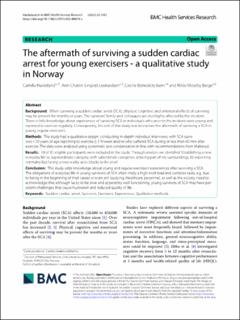| dc.contributor.author | Hardeland, Camilla | |
| dc.contributor.author | Leonardsen, Ann-Chatrin Linqvist | |
| dc.contributor.author | Isern, Cecilie Benedicte | |
| dc.contributor.author | Berge, Hilde Moseby | |
| dc.date.accessioned | 2023-02-21T14:22:53Z | |
| dc.date.available | 2023-02-21T14:22:53Z | |
| dc.date.created | 2022-10-11T20:29:57Z | |
| dc.date.issued | 2022 | |
| dc.identifier.citation | BMC Health Services Research. 2022, 22, Artikkel 1452. | en_US |
| dc.identifier.issn | 1472-6963 | |
| dc.identifier.uri | https://hdl.handle.net/11250/3052831 | |
| dc.description.abstract | Background: When surviving a sudden cardiac arrest (SCA), physical, cognitive, and emotional efects of surviving may be present for months or years. The survivors’ family and colleagues are also highly afected by the incident. There is little knowledge about experiences of surviving SCA in individuals who prior to the incident were young and reported to exercise regularly. Consequently, the aim of this study was to explore the aftermath of surviving a SCA in young, regular exercisers. Methods: The study had a qualitative design, conducting in-depth individual interviews with SCA survivors<50 years of age reporting to exercise≥5 h/week and/or who sufered SCA during or less than 60 min after exercise. The data were analysed using systematic text condensation in-line with recommendations from Malterud. Results: 18 of 31 eligible participants were included in the study. Through analysis we identifed ‘Establishing a new everyday life’ as superordinate category, with subordinate categories a) being part of my surroundings, b) expecting normality but facing a new reality and c) lucky to be alive! Conclusion: This study adds knowledge about young and regular exercisers’ experiences after surviving a SCA. The obligations of everyday life in young survivors of SCA often imply a high work load and complex tasks, e.g. due to being in the beginning of their career or even still studying. Healthcare personnel, as well as the society, need to acknowledge that although lucky to be alive and apparently well-functioning, young survivors of SCA may have per‑sistent challenges that cause frustration and reduced quality of life. | en_US |
| dc.language.iso | eng | en_US |
| dc.publisher | BioMed Central (BMC) | en_US |
| dc.rights | Navngivelse 4.0 Internasjonal | * |
| dc.rights.uri | http://creativecommons.org/licenses/by/4.0/deed.no | * |
| dc.subject | sudden cardiac arrest | en_US |
| dc.subject | survivors | en_US |
| dc.subject | exercisers | en_US |
| dc.subject | experiences | en_US |
| dc.subject | qualitative methods | en_US |
| dc.title | The aftermath of surviving a sudden cardiac arrest for young exercisers- a qualitative study in Norway | en_US |
| dc.type | Peer reviewed | en_US |
| dc.type | Journal article | en_US |
| dc.description.version | publishedVersion | en_US |
| dc.subject.nsi | VDP::Medisinske Fag: 700::Idrettsmedisinske fag: 850 | en_US |
| dc.source.volume | 22 | en_US |
| dc.source.journal | BMC Health Services Research | en_US |
| dc.identifier.doi | 10.1186/s12913-022-08674-z | |
| dc.identifier.cristin | 2060671 | |
| dc.source.articlenumber | 1452 | en_US |
| cristin.ispublished | true | |
| cristin.fulltext | original | |
| cristin.qualitycode | 2 | |

